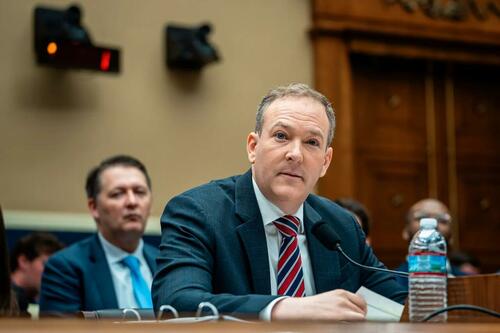Домовладельцы обеспокоены распространением химических веществ в канализационных удобрениях
Автор: Майкл Клементс, The Epoch Times (выделено нами),
Сельские землевладельцы говорят, что американские фермы стали свалками для осадков с очистных сооружений крупных городов. Они жалуются на неприятные запахи, загрязненную почву, проблемы со здоровьем и стоки ливневых вод, загрязняющие ручьи, озера и грунтовые воды потенциально опасными химическими веществами.
 Трактор распространяет удобрения на поле на ферме в Черч Хилл, штат Мэриленд, 20 марта 2025 года. Биосолиды, или обработанные осадки сточных вод, широко используются в Соединенных Штатах в качестве поправки к почве и удобрений. Но сельские землевладельцы и фермеры все больше обеспокоены неприятными запахами, загрязнением почвы, рисками для здоровья и стоками ливневых вод, переносящими потенциально опасные химические вещества в водные пути. Джим Уотсон/AFP с помощью Getty Images
Трактор распространяет удобрения на поле на ферме в Черч Хилл, штат Мэриленд, 20 марта 2025 года. Биосолиды, или обработанные осадки сточных вод, широко используются в Соединенных Штатах в качестве поправки к почве и удобрений. Но сельские землевладельцы и фермеры все больше обеспокоены неприятными запахами, загрязнением почвы, рисками для здоровья и стоками ливневых вод, переносящими потенциально опасные химические вещества в водные пути. Джим Уотсон/AFP с помощью Getty ImagesОбработанный осадок сточных вод, известный как «биосолиды», является твердым веществом, оставшимся от процесса очистки сточных вод. Осадок удаляется со дна резервуаров для сточных вод, а затем обрабатывается для уменьшения патогенов для использования в качестве поправки к почве или удобрения.
Индустрия биотвердых веществ продвигает обработанный ил как экологически чистый способ переработки отходов, которые в противном случае оказались бы на свалке, экономя деньги фермеров на удобрениях. Критики считают, что менее ощутимые затраты на осадок намного перевешивают любые выгоды.
Лютер, Оклахома, владельцы недвижимости Уолт и Саундра Трейвик говорят, что они впервые были введены в биотвердые тела от тошнотворного зловония за пределами их дома в 2018 году. Они говорят, что с тех пор они имеют дело с воздействием очищенных сточных вод и химических веществ PFAS, которые они несут.
"Это запах гниющей туши, но более металлический.Уолт рассказал The Epoch Times.
Саундра Трейвик сказал, что сосед распространяет биотвердые вещества с очистных сооружений в Оклахома-Сити и Талсе на своей земле. Она и некоторые ее соседи смогли запретить практику в их городе Лютер. И компания, распространяющая материалы, согласилась включить буферные зоны вокруг своей рабочей зоны.
 Семья Трейвик, (L-R) Ханна, Уолт, Элейн и Саундра, позируют на своей молочной ферме в Лютере, штат Оклахома, 9 апреля 2025 года. Трейвики, чья дочь Ханна страдает аутоиммунным расстройством, настаивают на запрете биотвердых веществ в штате из-за проблем со здоровьем, связанных с химическими веществами в материале. Майкл Клементс / The Epoch Times
Семья Трейвик, (L-R) Ханна, Уолт, Элейн и Саундра, позируют на своей молочной ферме в Лютере, штат Оклахома, 9 апреля 2025 года. Трейвики, чья дочь Ханна страдает аутоиммунным расстройством, настаивают на запрете биотвердых веществ в штате из-за проблем со здоровьем, связанных с химическими веществами в материале. Майкл Клементс / The Epoch TimesНо когда она связалась с городами, чтобы пожаловаться, ей сказали: «Вы не должны были переезжать сюда, если вам это не нравится, потому что мы делаем это в течение 40 лет». "
Использование биосолид в качестве удобрения было спорным с начала этого десятилетия, когда в иле были обнаружены пер- и полифторалкильные вещества (ПФАС), также называемые навсегда химическими веществами. Штат Мэн запретил эту практику из-за проблем общественного здравоохранения и безопасности.
ПФАС называют «вечными химическими веществами», потому что они не разрушаются легко и могут оставаться в почве, воздухе, воде, растениях и животных даже спустя годы после воздействия.
Спор еще больше усилился, когда новый глава Агентства по охране окружающей среды (EPA) объявил, что он тормозит процесс регулирования, начатый при бывшем президенте Джо Байдене.
14 мая, администратор EPA Ли Зельдин сказал, что агентство поддерживает свои текущие руководящие принципы по уровню ПФАС в питьевой воде.
EPA установило лимиты питьевой воды в 4 части на триллион для перфтороктановой кислоты (PFOA) и перфтороктансульфоната (PFOS) в марте 2023 года. Учреждение также предложило невыполнимые цели нулевого уровня максимального загрязнения химических веществ, поскольку "нет дозы, ниже которой любое химическое вещество считается безопасным. "
Агентство по охране окружающей среды также продлевает крайний срок для соблюдения руководящих принципов с 2029 по 2031 год.
"[Продление срока] будет поддерживать системы водоснабжения по всей стране, включая небольшие системы в сельских общинах, поскольку они работают над устранением этих загрязнителей. EPA также продолжит использовать свои инструменты регулирования и правоприменения, чтобы привлечь загрязнителей к ответственности, - говорится в пресс-релизе.
Каждое государство должно регулировать использование биосолид, используя правила EPA в качестве руководства. Только штат Мэн запрещает эту практику.
Джули Лэй из Гюнтерсвилла, штат Алабама, сказала, что в июне 1019 года у нее было собственное грубое пробуждение.
 Администратор Агентства по охране окружающей среды Ли Зельдин выступает перед подкомитетом Палаты представителей по окружающей среде на Капитолийском холме в Вашингтоне 20 мая 2025 года. В заявлении от 14 мая Зельдин сказал, что агентство будет придерживаться своих текущих руководящих принципов по уровню ПФАС в питьевой воде. Мадалина Василиу / The Epoch Times
Администратор Агентства по охране окружающей среды Ли Зельдин выступает перед подкомитетом Палаты представителей по окружающей среде на Капитолийском холме в Вашингтоне 20 мая 2025 года. В заявлении от 14 мая Зельдин сказал, что агентство будет придерживаться своих текущих руководящих принципов по уровню ПФАС в питьевой воде. Мадалина Василиу / The Epoch TimesИменно тогда она и ее семья заметили неприятный запах, исходящий от соседской собственности. Мать и жена много лет работали в сельском хозяйстве. Она никогда не встречала запаха, подобного тому, который окружал её дом.
"Это был ужасный запах.Ее муж Кит рассказал The Epoch Times.
Исследуя источник запаха, Лэй обнаружила, что государственные учреждения и сельскохозяйственные группы, которые, по ее мнению, выступают против распространения сточных вод на фермах, поддерживают эту практику в качестве экономически эффективной альтернативы коммерческим удобрениям.
Она сказала, что люди, с которыми она разговаривала, повторили утверждение, что биотвердые вещества «богаты питательными веществами» и полезны для почвы. Они отмахнулись от любой возможной опасности, потому что никто не мог сказать наверняка, что есть проблема.
Она обеспокоена тем, что к тому времени, когда будет найдена прочная связь между биосолидами и болезнями, ущерб земле и людям, которые едят выращенную на ней пищу, уже будет нанесен.
"Они использовали землю как морскую свинку, а всех нас использовали как морских свинок.— сказала она The Epoch Times.
EPA сообщает, что PFAS встречается во всех 50 штатах.
Химические вещества проникают с производственных предприятий, промышленных объектов и военных объектов на очистные сооружения, где они смешиваются с бытовыми сточными водами и сточными водами.
Химическая связь настолько сильна, что они выживают в процессе очистки сточных вод и остаются в осадке, который в конечном итоге продается в качестве удобрения.
Компания 3М, один из крупнейших производителей ПФАС, согласилась начать поэтапный отказ от химикатов в 2000 году. Однако, поскольку химические вещества существуют с 1940-х годов, большинство американцев, вероятно, уже подверглись воздействию.
Исследование 2016 года, опубликованное Департаментом здравоохранения и социальных служб, показало, что химические вещества в семействе PFAS могут нарушить иммунную систему человека. Исследования также показывают возможные связи с раком.
Читайте остальное здесь...
Тайлер Дерден
Свадьба, 06/18/2025 - 19:15











